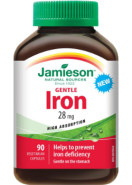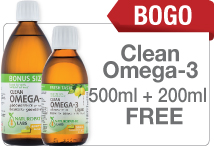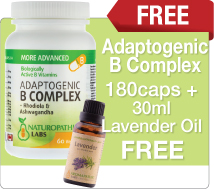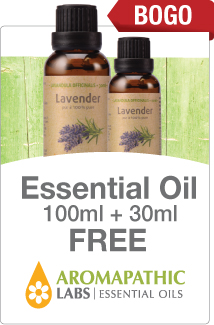Iron For Anemia
What Iron Is Best For Anemia?
Did you know that the iron we consume via food and/or supplements is stored in our liver as ferritin and released as needed to make new red blood cells in the bone marrow? These red blood cells, however, have a limited lifespan – lasting only approximately 120 days – after which they can no longer function and are re-absorbed by the spleen. Read more >-
 Gentle Iron from Jamieson is a unique formula that blends iron, folic acid, vitamin B2, B12, and vitamin C to help prevent and/or treat iron-deficiency anemia, and also help form healthy red blood cells. Jamieson's Gentle Iron provides a fast absorption, maintain a healthy immune system, while being gentle on the stomach. [VCAP]Gentle Iron from Jamieson is a unique formula that blends iron, folic acid, vitamin B2, B12, and vitamin C to help prevent and/or treat iron-deficiency anemia, and also help form healthy red blood cells. Jamieson's Gentle Iron provides a fast absorption, maintain a healthy immune system, while being gentle on the stomach. [VCAP]+ Earn 11 Reward Points
Gentle Iron from Jamieson is a unique formula that blends iron, folic acid, vitamin B2, B12, and vitamin C to help prevent and/or treat iron-deficiency anemia, and also help form healthy red blood cells. Jamieson's Gentle Iron provides a fast absorption, maintain a healthy immune system, while being gentle on the stomach. [VCAP]Gentle Iron from Jamieson is a unique formula that blends iron, folic acid, vitamin B2, B12, and vitamin C to help prevent and/or treat iron-deficiency anemia, and also help form healthy red blood cells. Jamieson's Gentle Iron provides a fast absorption, maintain a healthy immune system, while being gentle on the stomach. [VCAP]+ Earn 11 Reward PointsSale: $11.99
Reg.: $15.99 (Save $4.00)
In Stock
Best Iron for Anemia
Did you know that the iron you consume via food and/or supplements is stored in your liver as ferritin and released as needed to make new red blood cells in the bone marrow? These red blood cells, however, have a limited lifespan – lasting only approximately 120 days – after which they can no longer function and are re-absorbed by the spleen. While proper iron levels are important for many reasons, including anemia. Read on to learn the best iron supplement for anemia.
Iron is critically vital to maintaining many bodily functions, including the production of hemoglobin, the protein in blood that carries oxygen. Iron is also essential for healthy cells, skin, hair, and nails. Unfortunately, iron deficiency is widespread, especially among women who menstruate, particularly if menstrual periods are heavy, among those who are pregnant or breastfeeding, and those who have recently given birth. People who have recently undergone major surgery or physical trauma are also at risk of anemia, as are those who suffer from gastrointestinal diseases such as celiac disease, inflammatory bowel diseases such as ulcerative colitis or Crohn's disease, and those with peptic ulcers. Vegans and vegetarians are also at risk of anemia because of the low quantity of iron in plant-based foods vs. meats.
Anemia can cause unexplained fatigue or lack of energy, shortness of breath or chest pain, especially with activity, unexplained generalized weakness, rapid heartbeat, pounding in the ears, headaches, brittle nails and hair loss. If left untreated, anemia can result in pregnancy complications, including premature birth, and may increase a woman's chance of giving birth to a child with intellectual disability, autism, or ADHD.
Regardless of the cause(s), iron supplementation is necessary to correct iron deficiency anemia.
Benefits of Iron
- Boosts Energy
- Helps Prevent & Correct Anemia
- Helps Prevent Complications Associated with Iron Deficiency
- Relieves Weakness & Fatigue
- Restores Iron Levels
Iron Supplement For Anemia: Potency, Forms & Formats
Iron supplements are available in various delivery formats, such as tablets, capsules (gelatin and veggie-based), caplets, liquids, and even gummies. These are usually offered in potencies between 18 and 65 mg. It's important to note that high doses of supplemental iron (45 mg/day or more) may cause gastrointestinal side effects, such as nausea and constipation. Typically, iron supplements list two amounts on the label – the more significant number is the chemical compound form of iron (for instance, ferrous sulphate). In contrast, the smaller number refers to the amount of iron in the compound, or “elemental iron." Elemental iron is the more important number because this is the amount of iron available for the body to absorb. This is the number you should be paying attention to.
Final Thoughts
The amount of iron needed to treat iron deficiency and anemia is higher than the amount found in most multivitamin blends. Indeed, the amount prescribed to most people with iron deficiency or anemia is between 150 to 200 mg per day of elemental iron (or 2 to 5 mg of iron per kilogram of body weight per day). Speak to your health care practitioner to discuss how many mg of iron you should be taking daily for your specific needs.
Back to Top ↑





















